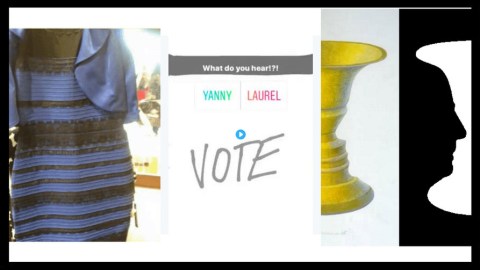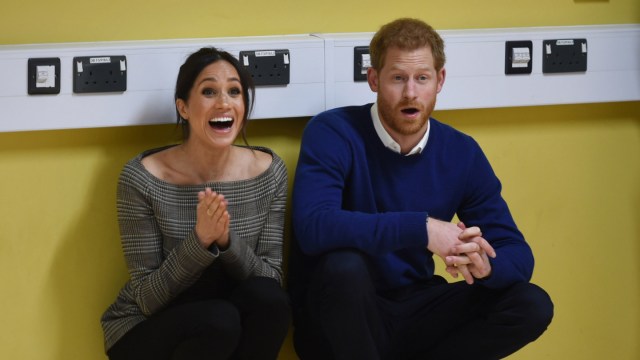The scientific reasons you hear ‘Laurel’ or ‘Yanny’ in that viral sound clip

Much like the gold/blue dress thing from several years ago, the Internet is on fire regarding this viral sound clip, which was originally posted to Instagram by high school student Roland Szabo, and then blew up on Reddit. It is a true audio illusion:
What do you hear?! Yanny or Laurel pic.twitter.com/jvHhCbMc8I
— Cloe Feldman (@CloeCouture) May 15, 2018
Assistant professor of audition and cognitive neuroscience Lars Riecke of Maastricht University put it in familiar terms: the vase that is also two figures in profile, known as Rubin’s vase, is very similar to this.
That is, of course, similar to the duck/rabbit illusion first described by psychologist Joseph Jastrow in 1899, and further pondered by Ludwig Wittgenstein in Philosophical Investigations.
The sounds are in fact both Laurel and Yanny at the same time, with some other, murkier sounds thrown in to confuse your ears and brain. Which one you hear is largely dependent on a number of things that science can explain. In no particular order:
- As we age, our ears hear fewer sounds in the high-pitched range. Those folks are more likely to hear Laurel.
- Your equipment (speakers, sound device, etc.) has a lot to do with it, as well. The more tinny, or high-pitched, the device and speakers tend to project, the more likely Yanny comes out. Or appears to, anyway.
- The mere suggestion of “Which sound do you hear?” with the two words also influences what our brains interpret. If there were no suggestions of what either sound is, it’d be much harder to be convinced of what you are actually hearing.
In a totally non-scientific poll at our house, I tried it myself just this morning. Before breakfast, I cranked up the speakers in my trusty old Macbook Air, and played it. Clearly, Laurel emanated. When I played it for my nine-year-old son, however, he heard something much closer to Yanny— I didn’t suggest either sound, but simply played it for him and asked what he heard. When I showed him the two words, he definitely sided with Yanny. For both of us, it was quite clear.
And when I began to play it again this afternoon (albeit at a lower volume), for me, it began with Yanny and evolved back to Laurel as I increased the volume.
Wow.
If you have the ability to tweak your sound output to emphasize both the higher and then the lower range, you will probably hear both as well—or at least, understand why people are divided on this.
Or you can use The New York Times' tool that can shape the sound both ways by changing the high and low pitches.
Good luck at your workplace or home in convincing anyone it's either/or.
Speaking of which, none other than the Philadelphia Police Department weighed in on Twitter about this, asking people NOT to call 911 to find answers. And somehow, I believe that they've experienced just such a phenomenon today.
Please don't call 911 to ask if we're hearing "Laurel" or "Yanny". The only thing we hear is the creation of another bad hashtag. (And Laurel. We're definitely hearing Laurel).
— Philadelphia Police (@PhillyPolice) May 16, 2018





